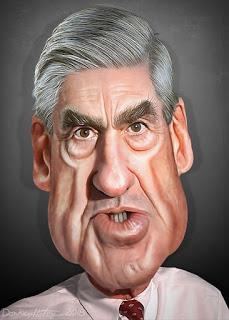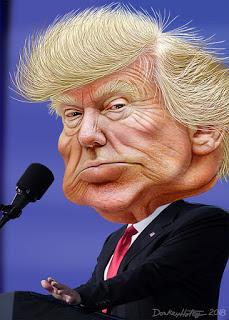
 (These caricatures of Robert Mueller and Donald Trump are by DonkeyHotey.)
(These caricatures of Robert Mueller and Donald Trump are by DonkeyHotey.)Can a president obstruct justice by firing officials who are investigating possible wrongdoing by him?
Many of us thought that question had been answered a few decades ago, when Richard Nixon tried to do that and was forced out of office because of it. But it seems that too many people refuse to learn from history -- and don't realize the danger of allowing any president to have that kind of power. Allowing a president to quash investigations of himself by simply firing those doing the investigation would give that president dictatorial power -- and it would be a serious blow to our system of checks and balances, which protects our democracy.
Trump has already fired two heads of the FBI in an effort to protect himself, and had to be talked out of trying to fire Robert Mueller last December. Many believe he will try again to fire Mueller, and obstruct justice.
Sadly, the current Republican-controlled Congress is doing nothing to protect Special Investigator Robert Mueller (and the rule of law). Would they be so slow to act if a Democrat was in the White House and tried to obstruct justice? Of course not. They need to rise above party politics and protect our democracy, even though the current resident of the White House is a member of their own party.
This is not just the belief of left-wingers like myself. Consider this editorial from the editorial board of the conservative Bloomberg News:
It's well past time for Speaker of the House Paul Ryan and Senate Majority Leader Mitch McConnell to stand up and protect special counsel Robert Mueller's investigation into Russian sabotage of the 2016 presidential election. McConnell this week said that even if a bipartisan bill to protect Mueller emerges from the Senate Judiciary Committee, he will block a vote. “We’ll not be having this on the floor of the Senate," he said. The proposed bill, authored by two Democrats and two Republicans, provides for expedited judicial review in the event the special counsel is fired. It would allow the special counsel to challenge any termination that he believes was not executed for good cause. McConnell and Ryan, whose respective bodies have exercised almost no oversight of an executive branch that careens from one scandal to the next, publicly insist that there is no reason to shield Mueller's investigation into relations between President Donald Trump's allies and foreign operatives. This is nonsense. After numerous indictments and guilty pleas already obtained by Mueller, and a related investigation that led to a raid last week by federal agents on the office, home and hotel room of Trump's personal lawyer, Michael Cohen, the president continues to attack the Mueller investigation, calling it "fake and corrupt" and a "total witch hunt." Trump long ago sought to derail Mueller, ordering White House counsel, Donald McGahn, to tell the Justice Department to shut down the investigation. McGahn rightly refused. Trump's eagerness to escape scrutiny does point to a problem with legislation to protect Mueller: The president would likely veto any such measure. Nonetheless, as he rages against the rule of law, Congress should acknowledge its duty to uphold it. One veto-proof way would be a sense-of-Congress resolution to put lawmakers on record in support of letting Mueller complete his investigation. Such resolutions have been used in the past to signal congressional resolve. Though lacking the power of law, a resolution would draw a line and warn the president not to cross it. Enough with the stalling. Failure to act could be the prelude to a constitutional crisis. Ryan and McConnell must protect Mueller's investigation.

